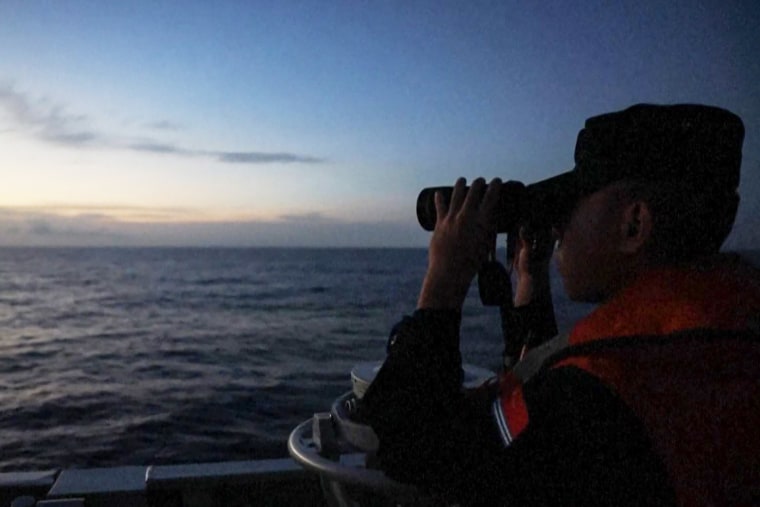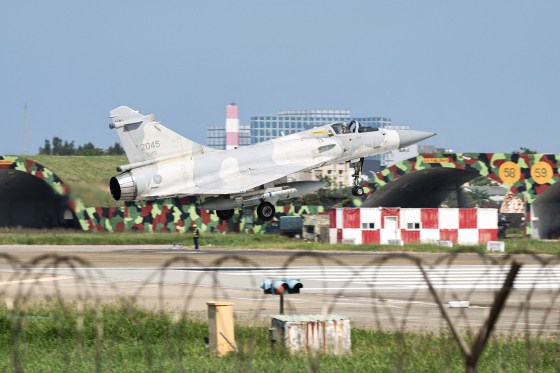HONG KONG — China conducted large-scale military drills around Taiwan on Monday in what it said was a warning to “independence forces” on the Beijing-claimed island.
The exercises had been expected after Beijing criticized a speech last week by Taiwan President Lai Ching-te. In the speech marking Taiwan’s National Day, Lai said that China had no right to represent the self-ruling democracy and its 23 million people but that he was willing to work with Beijing to address global challenges such as climate change.
China, which has not ruled out using force to achieve its unification goal, views Lai as a separatist and a “troublemaker.” The Chinese military also held two days of “punishment” drills around Taiwan after his inauguration in May.
The Chinese military said Monday evening local time that the latest exercises, known as “Joint Sword-2024B,” had been “successfully completed” after one day.
The drills, held around the north, south and east of Taiwan, were meant to test the joint operations capability of the Chinese army, navy, air force and rocket force, the Chinese National Defense Ministry said in an earlier statement. Vessels and aircraft approached the island “in close proximity from different directions,” the statement said.
“The drill also serves as a stern warning to the separatist acts of ‘Taiwan Independence’ forces,” said Senior Capt. Li Xi, spokesperson for the People’s Liberation Army’s Eastern Theater Command. “It is a legitimate and necessary operation for safeguarding state sovereignty and national unity.”
The Chinese military did not announce any live-fire exercises of the kind that took place after Rep. Nancy Pelosi, D-Calif., the House speaker at the time, visited Taiwan over Beijing’s objections in 2022.
The Taiwan president’s office said that Lai convened national security meetings Monday to discuss the appropriate response and that national security officials and the military were monitoring the situation.
China should “face the reality” of Taiwan’s existence and “respect the Taiwanese people’s choice of a democratic and free way of life,” the office said in a statement. “It should cease military provocations that undermine regional peace and stability.”
Beijing should understand the “goodwill” that Lai expressed Thursday in his National Day speech, the statement said, during which he emphasized Taiwan’s commitment to upholding peace and stability in the Taiwan Strait and its willingness to work with China to promote regional security.
A State Department spokesperson said the U.S., which is Taiwan’s most important international backer, was “seriously concerned” by the drills and called on China to act with restraint.
China’s “response with military provocations to a routine annual speech is unwarranted and risks escalation,” spokesperson Matthew Miller said.
The Pentagon called the Chinese military operation “irresponsible, disproportionate and destabilizing.”
Chang Wu-ueh, director of the Center for Cross-Strait Relations at Tamkang University in Taiwan, said the drills Monday were “within expectations.”
Lai’s National Day speech was not as important as his inaugural address in May, which prompted a similar set of exercises known as “Joint Sword-2024A,” Chang said.

“Since Beijing doesn’t have any trust or hope for President Lai Ching-te, no matter what he said, Beijing is bound to respond with ‘Joint Sword-2024B.’”
“Although cross-Strait relations are tense in the short term, the risks remain manageable,” Chang said, adding that tensions are unlikely to escalate further as long as the U.S. maintains open channels of communication with both China and Taiwan.
China has ramped up its military activities around Taiwan in recent years, sending military planes and ships toward the island almost daily.
Lai said in his National Day speech that Taiwan and China were “not subordinate to each other.”
“On this land, democracy and freedom are growing and thriving. The People’s Republic of China has no right to represent Taiwan,” he said.
He added that he would “uphold the commitment to resist annexation or encroachment upon our sovereignty.”
Chinese officials said Lai’s speech showed that he was “hellbent” on advancing Taiwan independence and trying to increase cross-Strait tensions for his “selfish political interest.”
Asked about the drills on Monday, the Chinese Foreign Ministry said the status of Taiwan was an internal affair and not a diplomatic issue, and that China was committed to maintaining regional peace and stability.
“‘Taiwan independence’ is as incompatible with cross-Strait peace as fire with water, and provocations by ‘Taiwan independence’ forces will be responded with countermeasures,” spokesperson Mao Ning said at a regular briefing in Beijing.
Though they view Beijing as a serious threat, most people in Taiwan believe China is “unlikely or very unlikely” to invade in the next five years, according to a poll released last week by Taiwan’s top military think tank.

